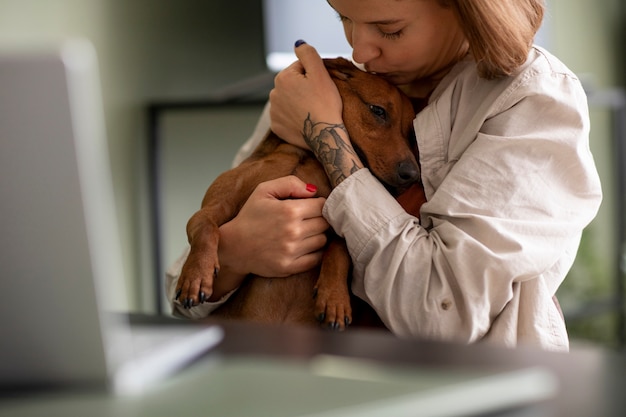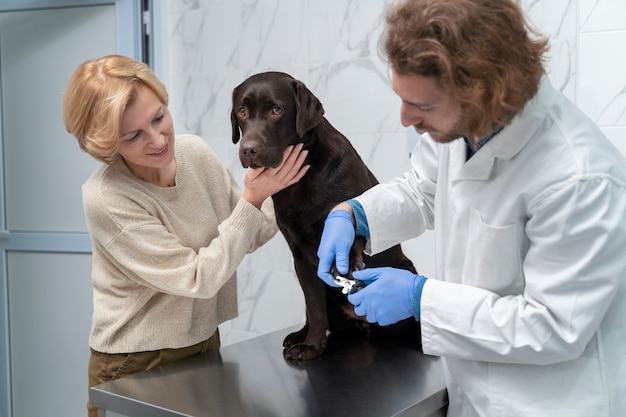Targeted Therapy for Pet Cancer: Advanced Options Explained


Targeted Therapy for Pet Cancer: Advanced Options Explained
When a beloved dog or cat is diagnosed with cancer, pet owners face a world of questions and worries. Advances in veterinary oncology treatments offer new hope, and one of the most exciting developments is targeted therapy for pet cancer. At Veterinary Cancer Health in South Florida, our veterinary oncology team is dedicated to providing advanced cancer care that prioritizes your pet’s comfort and quality of life. This blog will guide you through what targeted therapy means for pets, how it differs from traditional treatments, and what you can expect if you’re seeking specialized cancer care in South Florida and surrounding communities. As a referral-only specialty clinic, we’re here to work alongside your primary veterinarian and offer the latest precision medicine options available.
If you’re searching for an oncology vet near me or considering advanced veterinary oncology treatments in South Florida, this overview will help you understand how targeted therapy could be an option for your pet. We’ll review the signs that might suggest your pet could benefit from this approach, discuss the science behind targeted therapy, explain how the process works, and address practical steps for caring for a pet with cancer. Our veterinary oncology team is committed to providing compassionate, individualized care every step of the way.
Recognizing When Targeted Therapy May Be Needed for Your Pet
Cancer in pets can present with a wide variety of symptoms, some subtle and others more obvious. Early recognition is key to ensuring the best possible outcome with advanced treatments like targeted therapy. Pet owners in South Florida often notice changes such as persistent lumps or bumps, unexplained weight loss, reduced appetite, and lethargy. Other signs to watch for are difficulty breathing, chronic vomiting or diarrhea, unexplained bleeding, or persistent sores that do not heal.
Sometimes, cancer may affect a specific area such as the mouth, skin, or lymph nodes, resulting in localized swelling or pain. Additionally, behavioral changes, such as increased hiding or reluctance to play, can indicate discomfort or illness. If you observe these warning signs in your dog or cat, particularly if they persist for more than a few days, it is important to consult your primary veterinarian as soon as possible. They can perform an initial assessment and, if appropriate, refer you to a veterinary oncology specialist for advanced care.
Targeted therapy for pet cancer is often considered when traditional treatments alone—such as surgery, chemotherapy, or radiation—may not provide the best outcome, or when a more precise, less invasive approach is preferred. If your pet has been diagnosed with a specific type of cancer, especially one known to respond to targeted therapy, your veterinary team may recommend consultation with a specialty oncology vet near me to discuss these options.
Understanding the Science Behind Targeted Therapy in Veterinary Oncology
Cancer arises when cells in the body begin to grow uncontrollably and evade the body’s normal regulatory mechanisms. Unlike traditional chemotherapy, which affects both cancerous and healthy rapidly dividing cells, targeted therapy for pet cancer is designed to interfere with specific molecules or pathways involved in tumor growth and progression. The goal is to attack cancer cells directly while minimizing damage to normal tissues.
Targeted therapies in veterinary oncology can include small molecule inhibitors, monoclonal antibodies, and immunotherapies, each working in unique ways. For example, small molecule inhibitors may block signals that tell cancer cells to grow or divide, while monoclonal antibodies can bind to specific proteins on the cancer cell’s surface, marking them for destruction by the immune system. Some therapies focus on disrupting the blood supply to tumors, effectively starving the cancer of nutrients it needs to grow.
These treatments are often guided by advanced diagnostic testing, such as molecular profiling or genetic analysis of the tumor. This allows the veterinary oncology team to identify which targets are present in your pet’s cancer and select the most appropriate therapy. As research advances, more options become available for different types of cancer, including mast cell tumors, lymphoma, and certain sarcomas in both dogs and cats.
The science behind targeted therapy continues to evolve, with ongoing clinical trials and studies helping to refine these techniques for veterinary patients. For pet owners in South Florida and surrounding areas, having access to veterinary oncology treatments that utilize these latest advances can make a significant difference in both prognosis and quality of life for pets facing a cancer diagnosis.
How Targeted Therapy for Pet Cancer Is Provided at Specialty Clinics
When your pet is referred to a veterinary oncology specialist, the process typically begins with a thorough review of medical history and previous diagnostic results. The oncology team may recommend additional imaging, biopsies, or molecular testing to better understand the specific characteristics of your pet’s cancer.
Once a diagnosis is confirmed and the cancer’s molecular profile has been analyzed, the veterinary oncology team will discuss the most effective treatment options with you. Targeted therapy for pet cancer may be used as a standalone treatment or combined with traditional approaches such as surgery or chemotherapy, depending on the cancer type and stage.
Treatment options involve oral medications, injected drugs, or intravenous infusions, depending on the specific therapy selected. The veterinary team will monitor your pet closely throughout the process, performing regular check-ups and laboratory tests to assess response and manage any side effects. One of the key benefits of targeted therapy is that it often results in fewer side effects than traditional chemotherapy, making it especially valuable for pets with underlying health concerns or those who may not tolerate aggressive treatments.
As a pet owner, you can expect to receive clear explanations of the treatment plan, what to expect during therapy, and guidance on monitoring your pet’s comfort at home. The veterinary oncology professionals at Veterinary Cancer Health are committed to open communication, providing support and education throughout the treatment journey.
For those seeking advanced cancer care in South Florida, it’s important to understand that targeted therapy is not appropriate for every case, but when it is indicated, it can offer a highly personalized approach that increases the chances of successful management. If you are searching for oncology veterinary treatments in South Florida or an oncology vet near me, a specialty referral center is the best place to access these advanced services.
Supporting Your Pet at Home During and After Targeted Therapy
Caring for a pet undergoing targeted cancer therapy requires both diligence and compassion. Steps you can take at home include administering medications exactly as prescribed and maintaining regular appointments for follow-up care. It is important to monitor for changes in appetite, energy levels, or new symptoms; notify your veterinary oncology team promptly if any concerns arise.
Providing a quiet, comfortable space for your pet to rest is essential, as is offering a balanced diet to support recovery. Encouraging gentle activity and normal routines can help maintain their emotional wellbeing. In some cases, the veterinary team may recommend specific nutritional supplements or supportive therapies to address side effects or boost your pet’s immune system.
Staying informed about your pet’s treatment plan and knowing what side effects are expected can help you respond quickly if your pet’s condition changes. Common side effects of targeted therapy may include mild digestive upset or skin changes, but many pets tolerate these therapies very well. Your veterinary oncology team in South Florida will provide detailed instructions tailored to your pet’s individual needs.
Support from family members and friends can make a big difference, and open communication with your veterinary oncology professionals ensures that you never have to navigate the process alone. For many families, seeking guidance from a specialist vet near me or researching targeted cancer therapy options becomes an important part of advocating for their pet’s best outcome.
When to Seek Veterinary Oncology Care in South Florida
Knowing when to seek professional help is crucial for pets with cancer. If your primary veterinarian has identified a suspicious mass, abnormal bloodwork, or imaging findings that suggest cancer, timely referral to a specialty oncology clinic can provide access to the most advanced diagnostic and treatment options.
You should contact a veterinary oncology specialist if your pet’s cancer is not responding to standard therapies, if you are interested in exploring targeted therapy, or if you want a second opinion about the best treatment plan. Early intervention often leads to better outcomes, and a specialist can offer insights into which therapies are most likely to benefit your pet based on the latest research and technology.
For pet owners in South Florida and surrounding communities, finding an oncology veterinarian near me means partnering with a team that is dedicated to your pet’s health and your peace of mind. The oncology professionals at Veterinary Cancer Health are available to answer questions, coordinate with your primary veterinarian, and develop a personalized plan for your pet’s care.
Taking the Next Step: Advanced Cancer Care for Pets in South Florida
Facing a cancer diagnosis in your pet is never easy, but advances in veterinary oncology treatments offer real hope for families who want the best for their dogs and cats. Targeted therapy for pet cancer represents a new era of precision medicine, allowing specialists to attack tumors more effectively while protecting healthy tissues and preserving quality of life. If you have noticed changes in your pet’s health or have received a cancer diagnosis, we encourage you to speak with your primary veterinarian about a referral to our South Florida clinic.
Our veterinary oncology team at Veterinary Cancer Health is committed to compassionate, individualized care for every patient. We are proud to serve South Florida and surrounding communities, providing access to the latest options in targeted therapy for pet cancer. If you are searching for an oncology specialist vet near me or want to learn more about advanced veterinary oncology treatments in South Florida, we invite you to reach out to our clinic.
To discuss your pet’s diagnosis or schedule a consultation, call (195) 459-28504 today. Our team will be happy to answer your questions and guide you through the next steps. Trust Veterinary Cancer Health to be your partner in advanced cancer care for pets in South Florida. For more information about targeted therapy for pet cancer, we encourage you to consult reputable veterinary oncology resources or contact our clinic directly.
This blog is for informational purposes only and does not replace the advice of your primary care veterinarian or veterinary oncology specialist. Always consult with a veterinary professional for personalized guidance regarding your pet’s health.

.png)















